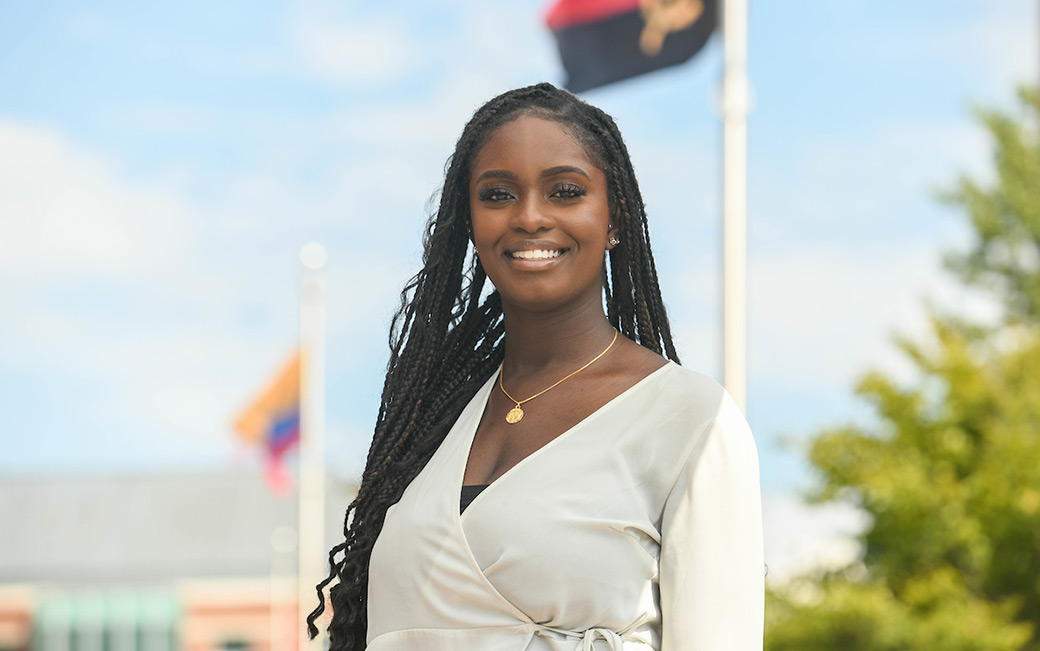Following her roots, passion to Senegal
College of Health Professions student reconnects with family, explores global health studying abroad
By Megan Bradshaw on October 29, 2019

Astou Gaye ’20 has always been close with her family. Her older sister, studying to be a pediatrician, inspired Gaye to pursue a career in child and maternal health through Towson University’s health education and promotion major[BROKEN LINK].
Niya Werts, an associate professor in the College of Health Professions and the director of the health science master’s program, introduced Gaye to the car seat initiative Maryland’s Kids in Safety Seats.
The program, a community intervention program that provides car seats to low-income families in Maryland, is something Gaye is “very passionate” about.
“I liked the idea of bringing solutions to the problems people are having with their health,” she says. “It could be like violence prevention or mental health, any type of community initiative. I've always been the type person that always like likes to help others.”
About once a month she has appointments with families to give them instructions about car seat safety then hands out the car seats.
After receiving a Gilman International Scholarship, Gaye traveled to Senegal to study at Cheikh Anta Diop University in Dakar. She has family living in the city, including an aunt who is also attending the university to earn a master’s degree and an uncle who is a science professor there. Between Gaye’s parents, there are 24 aunts and uncles living in Senegal.
Gilman Scholarships expand opportunities for study abroad for students whose demonstrated financial need might otherwise preclude them from such an experience. The scholarship provides awards to undergraduate students who are receiving Federal Pell Grant funding. Award amounts will vary depending on the length of study and student need with the average award being $4,000.
Learn about study abroad opportunities
“This is my first time that I was able to travel by myself,” Gaye relates. “I stayed at a host family's house instead of my other relatives that live over there just because I wanted the chance to immerse myself completely in the local culture and just get a feel for what it's like to be young person living in Senegal.”
While abroad she immersed herself in child and maternal health issues in Senegal like widening access to clinics and hospitals for women in rural areas and addressing the effects of underfunded schools and family poverty on children.
“I had an Intro to Public Health with the African Perspective course for three hours every day. It was a rigorous course, but I definitely learned a lot. I’m considering returning to Senegal after I graduate. The course gave me insight into what Senegalese public health initiatives are priorities and what I can bring from my studies in the U.S. to help them.
“I also took a Wolof course three times a week so I could communicate with my family and understand their personalities and who they are as a person,” she continues. “That helped us connect even more because we were pretty similar in how we acted, especially like my cousins who are around my age. I enjoyed being around them the most because they were just all goofy and really silly and loving.”
Gaye credits the course—Wolof is one of Senegal’s native languages—with not only improving her language skills but also introducing elements of Senegalese culture.
“A lot of times as the daughter of an immigrant, you know that you have certain customs but you don't know where they come from or the reason why you do those things. That course created a deeper understanding of my country as a whole.”
Gaye’s education wasn’t confined to the classroom. She took several class field trips that gave her firsthand acquaintance with public health in the west African country.
She volunteered once a week at one of the first orphanages in Senegal, cuddling the babies. Gaye also visited a holistic hospital a few hours outside of Dakar with her public health course.
“It was an initiative from the government to create safer alternatives using the medicine coming from the native plants as opposed to the more Westernized route of treating symptoms,” she says. “We saw the garden where they grow most of the plants and trees that they make medicine from. The staff also showed us the medicinal recipes. They work with biologists from the university to confirm that those recipes can be considered effective in treating something like diabetes or hypertension.”
A few months removed from her study abroad experience, Gaye feels more than ever she is on the right career track. She is looking into attending a graduate school in the U.S. before potentially returning to Senegal.
“Going to Senegal was very important to my future career plans,” she notes. “Taking this first step really helped get the ball rolling for me. It changed me a little bit too, honestly, when it came to like my confidence, because this is a dream of mine. Once you achieve those dreams, it's just like, ‘Wow, I can do anything, and I really owe that to the Gilman scholarship.”
MORE INFORMATION
Studying health education and promotion at TU
The field of health education and promotion explores the complexities of human behavior and identifies ways to promote healthy behaviors.
- Learn more about the health education and promotion major[BROKEN LINK].
- Request information about Towson University.